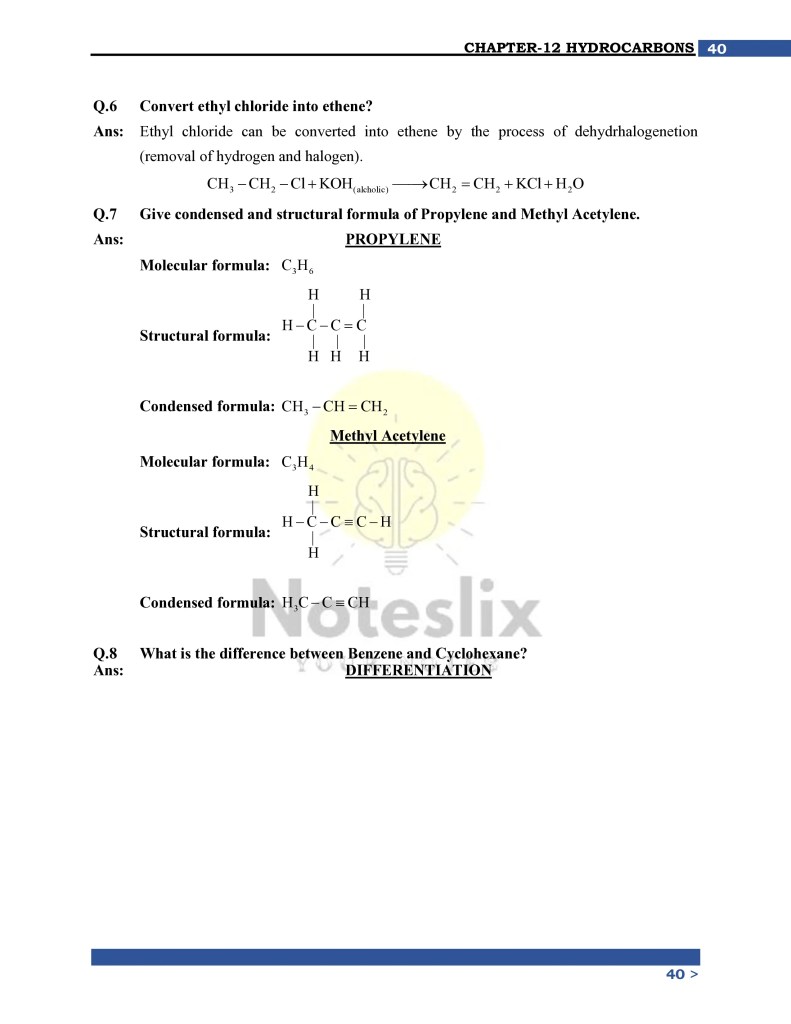Chapter 12 of Class 10th Chemistry, titled “Hydrocarbons,” delves into the essential concepts surrounding the classification, properties, and significance of hydrocarbons.
This chapter emphasizes the foundation of organic chemistry, equipping students with a strong understanding of saturated and unsaturated hydrocarbons.
In this article, we aim to provide additional conceptual questions to strengthen students’ grasp of these concepts, paving the way for success in their exams.







Topics Covered in These Notes
The additional conceptual questions focus on the following major topics from Chapter 12:
- Classification of Hydrocarbons: Distinguishing between alkanes, alkenes, alkynes, and aromatic compounds.
- Physical and Chemical Properties: Understanding solubility, reactivity, and combustion processes.
- Uses of Hydrocarbons: Applications in fuels, synthetic fibers, and other industrial products.
- Preparation and Reactions: Detailed explanations of hydrogenation, halogenation, and other key reactions.
These topics provide a comprehensive understanding, ensuring clarity in both theoretical and practical applications.
Class 10th Chemistry Chapter 12: Additional Important Conceptual Questions
- What is the significance of hydrocarbons as a starting material in chemical industries?
- Hydrocarbons form the backbone of several industrial products, such as plastics, synthetic fibers, and rubbers.
- Why are alkanes called paraffins?
- Alkanes are the least reactive hydrocarbons due to their fully saturated single bonds, hence referred to as paraffins, meaning “little affinity.”
- Explain why alkenes are more reactive than alkanes.
- Alkenes possess double bonds, which are more reactive due to the availability of π-electrons for addition reactions.
- Describe the differences in combustion between saturated and unsaturated hydrocarbons.
- Saturated hydrocarbons burn with a clean flame, while unsaturated hydrocarbons produce a smoky flame due to incomplete combustion.
- How do functional groups affect the properties of hydrocarbons?
- Functional groups like –OH or –C≡C– introduce polarity and increase reactivity, altering solubility and boiling points.
Tool for Success in Exams
These extra conceptual questions are designed to clarify common doubts and strengthen understanding. They cover a range of difficulty levels, ensuring students are well-prepared for competitive exams and board evaluations.
By practicing these questions, students can refine their analytical skills and excel in problem-solving.
Colored Notes
To make the content visually engaging and easy to revise, the notes have been color-coded:
- Key Definitions: Highlighted in blue.
- Examples: Marked in green for quick reference.
- Important Questions: Emphasized in red to focus on high-priority topics.
Notes Are Free to Use
One of the key advantages of these notes is that they are entirely free for students and educators. You can access and download them without any cost, making them a valuable resource for both classroom learning and self-study.
With a focus on accessibility, these notes are designed to support students from diverse educational backgrounds, ensuring equitable learning opportunities.
Notes Are Mistake-Free
Accuracy is paramount when it comes to educational content, and these notes are meticulously curated to be error-free. Each topic has been verified for precision, ensuring that students receive reliable information.
Mistake-free notes enhance confidence and help students focus solely on their learning without second-guessing the material.
Conclusion
Class 10th Chemistry Chapter 12 focuses on hydrocarbons, a fundamental concept in organic chemistry. With the additional conceptual questions provided here, students can deepen their understanding, sharpen their problem-solving skills, and prepare effectively for exams.
These notes, free of errors and optimized for user-friendly navigation, serve as a perfect companion for mastering hydrocarbons. From basic concepts to advanced applications, these materials cater to every student’s needs, ensuring academic excellence.
Other Class 10th Chemistry Important Conceptual Questions
- Class 10th Chemistry Chapter 9 Important Conceptual Questions
- Class 10th Chemistry Chapter 10 Important Conceptual Questions
- Class 10th Chemistry Chapter 11 Important Conceptual Questions
- Class 10th Chemistry Chapter 13 Important Conceptual Questions
- Class 10th Chemistry Chapter 14 Important Conceptual Questions
- Class 10th Chemistry Chapter 15 Important Conceptual Questions
- Class 10th Chemistry Chapter 16 Important Conceptual Questions

